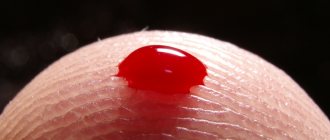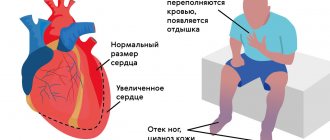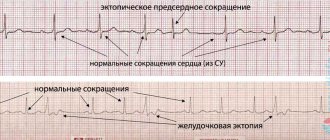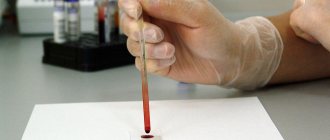Hemoptysis - a frightening condition in which blood is periodically released along with sputum during coughing. In some cases, these are only bloody inclusions, while in others the blood completely stains the sputum. Based on the type and amount of blood impurities, one can roughly guess the source and cause of the bleeding, but delaying a visit to the doctor is unacceptable. In Anapa, the diagnosis and treatment of diseases that cause hemoptysis are dealt with in medicine.
Coughing up blood: causes of illness in adults
In some cases, when the cough is strong, dry and hysterical, a small amount of scarlet blood in the sputum may be the result of damage to small superficial vessels in the bronchi, pharynx or trachea. This phenomenon is not dangerous if it is not accompanied by other alarming signs. However, if the cough does not subside, the symptoms increase, the volume of blood is significant, or the streaks do not disappear, this may be a sign of serious problems and illnessesSource: EarwoodJS, ThompsonTD. Hemoptysis: evaluation and management // Am Fam Physician. 2015 Feb 15;91(4):243-9..
Internal pathologies
The most common diseases of internal organs that lead to the taste of blood in the mouth include:
- bronchitis;
- pneumonia (pneumonia);
- lung abscess;
- lungs' cancer;
- cystic fibrosis;
- tuberculosis;
- dysfunction of the heart;
- disruption of the gastrointestinal tract (GIT);
- diseases of the ENT organs.
Neurological diseases can also cause the taste of blood in the mouth. A signal travels through the nerve fibers of the brain to the taste buds; if its transmission is disrupted, an unusual taste may appear in the mouth.
However, neurological problems accompanied by a blood taste usually have other unpleasant manifestations. For example, they may be accompanied by headaches, hearing problems, hand tremors, trembling eyelids, and lumbago in certain areas of the face.
In very rare cases, the taste of blood in the mouth is caused by heavy metal poisoning. A similar problem often awaits workers in chemical laboratories and metal processing plants. Intoxication of the body is accompanied by other unpleasant symptoms - attacks of dry cough, nausea, aching limbs, swelling of the gums, and lack of appetite. Dysbacteriosis is also rarely the cause.
What diseases are typical for hemoptysis?
The appearance of sputum with blood when coughing is called hemoptysis, it is possible with various diseases:
- COPD with severe bronchitis or emphysema;
- pneumonia (acute or exacerbation of chronic);
- tuberculous lesions of the lungs and bronchi;
- cancerous tumor in the lungs;
- injuries to the chest and lung tissue.
In addition, impurities of blood in coughed up mucus are possible with lesions of the nasopharynx (including nosebleeds) and the upper parts of the digestive tract.
If cough or hemoptysis appears, even without fever, it is important to consult a doctor. This is especially dangerous if symptoms such as fever, shortness of breath, severe weakness, pain in the body or limbs appear against the background of coughing up blood. You need to call an ambulance immediately. Such an attack may be a symptom of a serious illness. It is important to immediately determine the correct diagnosis and begin treatment. Source: K. Krenev, Ya Kabysh, O Yudin. Difficult patient or patient with hemoptysis // Sciences of Europe, 2021, No. 48, pp. 17-22.
Possible complications
Ignoring the symptoms of minor hemoptysis can lead to the development of massive bleeding.
It causes the airways to fill with blood, which blocks access to air. As a result, death from asphyxia (suffocation) may occur. Death is also possible with heavy blood loss, amounting to about 4–4.5% of the total body weight. If left untreated, the disease that caused hemoptysis continues to progress and cause complications. With cancer, metastases appear, with pneumonia and tuberculosis - fibrosis of the lung tissue, with bronchiectasis - bleeding, abscess, infarction and necrosis of the lung.
Diagnostic methods
Since coughing up blood can be a sign of a serious illness, it is important to make a diagnosis as quickly and accurately as possible. A complex of laboratory tests and necessarily radiography or CT, ultrasound or MRI are required to determine the source of bleeding, especially if it is severe enough. Sometimes blood may not come from the respiratory system, but from soft tissues, the pleural cavity or the esophagus.
A detailed medical history is important - all health problems that preceded the appearance of the cough (smoking, injuries, colds, abdominal pain, etc.). They may indicate possible causes. If the source of bleeding is in the bronchi, an additional bronchoscopy may be prescribed. All diagnostic procedures are usually performed during hospitalization in a clinic.
How to quickly stop bleeding from gums
What to do if you need to quickly stop bleeding from your gums? For this purpose, you can use one of the following methods:
- Rinse your mouth with cold water or mint mouthwash. Decoctions of herbs - chamomile, oak bark, fir, calendula - help reduce the manifestations of unwanted symptoms.
- Apply a cotton swab soaked in chlorhexidine to the bleeding area. You need to press it tightly and wait until the bleeding stops.
- Glue a special protective homeopathic strip. You can buy it at the pharmacy.
No matter how long your gums bleed, you cannot put off a visit to the dentist. The problem will not go away on its own, but will only get worse.
Treatment
It is important to remember that hemoptysis is only a symptom. It is important to treat the underlying condition and make efforts to stop the bleeding. If these are inflammatory processes (pneumonia, bronchitis), a course of antibiotics and anti-inflammatory therapy in combination with drugs to regulate blood clotting are indicated. Regular cleansing of the bronchi from bloody sputum (sanitation) is also indicated.
If this is a tuberculosis lesion, anti-tuberculosis therapy is necessary, including surgical interventions on the affected lesions (cavities). For injuries and abscesses, the solution to problems is surgery; for cancerous lesions, tactics are selected individually, depending on the stage. Source: Ittrich H, Bockhorn M, Klose H, Simon M. The Diagnosis and Treatment of Hemoptysis // The Diagnosis and Treatment of Hemoptysis.Dtsch Arztebl Int. 2017 Jun 5;114(21):371-381. doi: 10.3238/arztebl.2017.0371..
How to eliminate constant bleeding gums
To carry out successful treatment, it is important to find out why the gums are bleeding. You should not self-medicate, since the problem requires an integrated approach, which consists in eliminating the cause and restoring the health of the gums. Only a doctor can tell you how to treat a disease that causes bleeding. Different techniques may be needed.
Professional teeth cleaning
If dental plaque provokes complications in the form of bleeding, it is necessary to thoroughly clean your teeth. This does not mean ordinary hygiene procedures at home, but hardware cleaning in a dental office. The doctor uses ultrasound to crush the tartar, the particles of which are washed out with a mixture of water and air. You need to carry out a hygiene procedure twice a year. Unfortunately, not all patients comply with such recommendations.
Air Flow technology is used to remove soft deposits. In this case, finely dispersed soda is supplied along with water. After the procedure is completed, the teeth are polished, which further prevents the accumulation of plaque.
Such actions are sufficient for diagnosed gingivitis. The doctor will also tell you what to do to restore the mucous membrane. This may include rinsing or taking certain medications. Professional teeth cleaning is used if gingivitis has progressed to periodontitis. But this is only the beginning of treatment. Let's talk about ways to eliminate the disease further. If periodontal pockets have formed, you will need powerful ultrasound devices, such as Vector. In this case, the periodontist should deal with oral hygiene.
Rinse with solutions
Antiseptic treatment of the oral cavity can be carried out in the form of rinses based on the following agents:
- "Furacilina";
- "Rotokana";
- "Miramistina";
- "Chlorhexidine";
- alcohol solution "Chlorophyllipt".
Soda-saline solution also helps. You can add a few drops of iodine to it. It is better to use solutions through an irrigator - this increases their effectiveness. In case of bleeding, you need to use special toothpastes, including Parodontax, Lakalut, Colgate Total Pro. The compositions should not have a bleaching effect.
Drug therapy
To eliminate bleeding gums, the doctor may prescribe ointments and gels. They are applied to the problem area after rinsing the mouth. The following drugs are in demand in dental practice:
- "Metrogil Denta" - has antibacterial and anti-inflammatory properties, often prescribed for stomatitis, after tooth extraction;
- “Asepta” is a propolis-based gel that quickly relieves inflammation;
- "Kamistad" is a drug available in two forms (for children and adults);
- "Elugel" is a strong antiseptic that effectively fights pathogenic environments.
For inflammatory processes, the doctor may prescribe medicinal bandages, antibiotics (in some cases), and a course of vitamins.
Gum curettage
For periodontitis with the formation of deep periodontal pockets, the following surgical techniques are used:
- Closed curettage. To carry out the procedure, the doctor uses a special instrument – a curette. With its help, the doctor cleans the roots of the teeth. The tool penetrates to a depth of 3 mm.
- Open curettage. The technique is used when the deposits are deeper. It involves the following actions: peeling of the gums, cleaning and antibacterial treatment, suturing.
The disease can be cured using an integrated approach. Therefore, it is important to follow all doctor’s recommendations even after the procedure.
Prevention
The main methods of preventing hemoptysis are preventing the pathologies that cause it. Quitting smoking, maintaining a healthy lifestyle, regular exercise, and timely treatment of colds are important.
Sources:
- Earwood JS, Thompson TD. Hemoptysis: evaluation and management // Am Fam Physician. 2015 Feb 15;91(4):243-9.
- Ittrich H, Bockhorn M, Klose H, Simon M. The Diagnosis and Treatment of Hemoptysis // The Diagnosis and Treatment of Hemoptysis.Dtsch Arztebl Int. 2021 Jun 5;114(21):371-381. doi: 10.3238/arztebl.2017.0371.
- K. Krenev, I am Kabysh, O Yudin. Difficult patient or patient with hemoptysis // Sciences of Europe, 2021, No. 48, pp. 17-22
Preventive measures
To avoid gum problems, you must follow a number of simple rules:
- Perform high-quality and correct hygiene procedures aimed at oral health. It is necessary to select care products that will not injure the mucous membrane. You should brush your teeth morning and evening. Use dental floss with caution. Instead, you can use an irrigator, which will help effectively remove food debris. Your toothbrush should be changed every three months.
- Balance your diet. The body must receive all the necessary vitamins and minerals. To strengthen teeth and gums, it is important to eat solid plant foods, such as apples and carrots.
- Give up bad habits, in particular smoking. Toothpicks should be used with caution.
- Regularly undergo preventive examinations at the dentist - at least twice a year. This will allow timely detection of oral diseases.
Paying close attention to your oral health will help you maintain a beautiful and healthy smile for many years.
Excessive salivation during pregnancy
During pregnancy, hormonal changes occur in the female body. The main reasons why an expectant mother’s salivation increases.
- Heartburn. When the acid-base balance in the stomach is disturbed, the body begins to produce a lot of saliva. This is a defensive reaction.
- Reaction to medications.
- Toxicosis. To stop gagging, the expectant mother tries to swallow saliva less often. Therefore, it may seem that there is more saliva in the mouth than usual.
A large amount of saliva does not threaten the fetus, however, if this is a consequence of any disease, then the pregnant woman should monitor her condition.
What complications are possible?
- Impaired taste perception of food.
- Dehydration of the body.
- Insomnia, disturbance of psycho-emotional state.
- Deterioration of the skin condition on the face and body.
- Infectious diseases.
Increased salivation: causes and treatment
Hypersalivation - what is it?
Why is there a lot of saliva in the mouth?
Salivation during sleep
Excessive salivation during pregnancy
Treatment of hypersalivation
Saliva is not just a liquid secreted in the mouth. Saliva is involved in the digestion process and protects the body from bacteria. The process of salivation is not controlled by humans. Usually about 2 liters of saliva are produced per day. Under the influence of certain factors, its amount can greatly increase. In this article we will talk about the causes of increased salivation and how to treat it.
When to go to the doctor?
Take your child to the doctor if your child's sore throat does not go away after breakfast.
Call an ambulance immediately if:
- the child has difficulty breathing;
- he cannot swallow;
- The infant is drooling unusually, which may indicate an inability to swallow saliva.
If an adult has pharyngitis, visit a doctor in the following cases:
- severe or prolonged (more than a week) sore throat;
- throat hurts often;
- difficulty breathing, swallowing, or opening your mouth;
- earache;
- joint pain;
- rash;
- fever above 38.3 for more than three days;
- blood in saliva or sputum;
- pain when turning the head;
- nodes and tumors in the neck;
- Hoarseness, hoarseness lasts more than two weeks.
What could be the reasons?
There are many reasons for coughing up blood. For example, traumatic damage to the trachea, pulmonary arteries or bronchi during tracheobronchoscopy. Various lung diseases can also be a source:
- Acute or chronic bronchitis
- Pneumonia
- Lung abscess
- Tuberculosis
- Pulmonary embolism
- Bronchiectasis
- Respiratory cystic fibrosis
- Lung cancer
Causes of hematoma formation on the oral mucosa
The general scheme of hematoma formation is as follows: a rupture of a vessel causes the leakage of a certain amount of blood, followed by its compaction and the appearance of a blood clot. A bubble forms, noticeable on the smooth surface of the mucosa due to its dark coloring and relief. Often a similar picture can be observed during teething, when the gums bleed and become inflamed. The formation of multiple small hematomas, covering the entire surface of the mucous membrane in the mouth with unattractive dark spots, looks very unpleasant for the patient. But don’t panic if you suspect you have a serious illness. As practice shows, most of these phenomena occur due to mechanical trauma to the mucous membrane. But there are exceptions when the symptom indicates:
- allergic reaction;
- chronic injury;
- consequences of stressful situations;
- burns or cuts to the mucous membrane.
There have also been cases when multiple hematomas in the oral cavity are signs of:
- diabetes mellitus;
- hypertension;
- renal failure;
- complex types of stomatitis;
- blood diseases;
- vitamin deficiency, which causes fragility of blood vessels.
The exact cause and stage of formation of the pathology can only be determined after a thorough examination and diagnosis. For this reason, you should not self-medicate, so as not to further injure damaged tissues.










